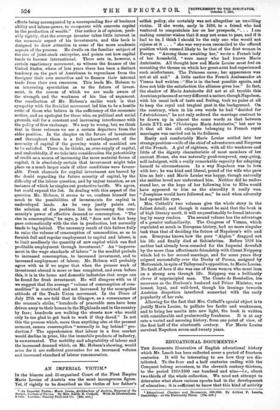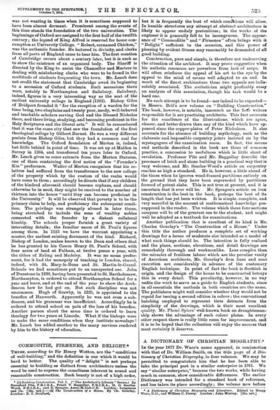EDUCATIONAL DOCUMENTS.*
THE documents illustrative of English educational history which Mr. Leach has here collected cover a period of fourteen centuries. It will be interesting to see how they are dis- tributed. To the four and a half centuries ending with the Conquest belong seventeen, to the eleventh century thirteen, to the period 1100-1500 one hundred and nine—i.e., about two-thirds of the whole collection. We need not attempt to determine what share various epochs had in the development of education; it is sufficient to know that this kind of activity • Bducationat Charters and Documents, 588-1900, By Arthur F. Leach,'
Cambridge : at the University Press. [10s. net.] .
was not wanting in times when it is sometimes supposed to have been almost dormant. Prominent among the events of this time stands the foundation of the two universities. The beginnings of Oxford are assigned to the first half of the twelfth century ; the legend of King Alfred is reserved for home con- sumption at University College. " Robert, surnamed Chicken," was the authentic founder. He lectured in divinity, and clerks from all parts of England came to hear him. The first mention of Cambridge occurs about a century later, but it is such as to show the existence of an organized body. The Sheriff is directed by the King to assist the Chancellor and Masters in dealing with misbehaving clerks who were to be found in the multitude of students frequenting the town. Mr. Leach does not credit the statement that Cambridge owed its beginning to a secession of Oxford students. Such secessions there were, notably to Northampton and Salisbury. Salisbury, indeed, figures in a very interesting way as the seat of the earliest university college in England (1262). Bishop Giles of Bridport founded it " for the reception of a warden for the time being, two chaplains and twenty poor, needy, well-behaved and teachable scholars serving God and the Blessed Nicholas there, and there living, studying, and becoming proficient in the Holy Scriptures and the liberal arts." It will be remembered that it was the same city that saw the foundation of the first theological college by Gilbert Burnet. He was a very different prelate from Bishop Giles, but they bad a common zeal for knowledge. The Oxford foundation of Merton is, indeed, but little behind in point of time. It was set up at Malden in Surrey in 1264, and transferred ten years later to Oxford. Mr. Leach gives us some extracts from the Merton Statutes, one of them containing the first notice of the "Founder's Kin" preference. Walter of Merton recognizes that his re- latives had suffered from the transference to the new college of the property which by the custom of the realm would have come to them ; accordingly he directs that if any children of the kindred aforesaid should become orphans, and should otherwise be in need, they might be received to the number of thirteen into the house " until they can become proficient in the University." It will be observed that poverty is to be the primary claim to help, and proficiency the subsequent condi- tion. The privilege was strangely abused in later times, being stretched to include the sons of wealthy nobles connected with the founder by a distant collateral kinship. The schools proper furnish a great variety of interesting details; the familiar name of St. Paul's figures among them. In 1125 we have the warrant appointing a master, the earliest existing document of the kind. Richard, Bishop of London, makes known to the Dean and others that he has granted to his Canon Henry St. Paul's School, with four acres of land at Fulham, at twelve pence a year, with the tithes of Ealing and Madeley. It was no mean prefer- ment, for it had the monopoly of teaching in London, shared, indeed, with St. Mary-le-Bone and St. Martin-le-Grand. Schools we find sometimes put to an unexpected use. John of Dunstone in 1230, having been presented to St. Bartholomew, Northampton, is ordered to attend Northampton School for a year and learn, and at the end of the year to show the Arch- deacon how he had got on. But such discipline was not uncommon. Hugh of Scawby, in 1225, is appointed to the benefice of Hanworth. Apparently he was not even a sub- deacon, and his grammar was insufficient. Accordingly he is ordered to attend school on pain of the loss of his benefice. Another parson about the same time is ordered to learn theology for two years at Lincoln. What if the bishops were to make the same conditions when they institute nowadays ! Mr. Leach has added another to the many services rendered by him to the history of education.































































 Previous page
Previous page